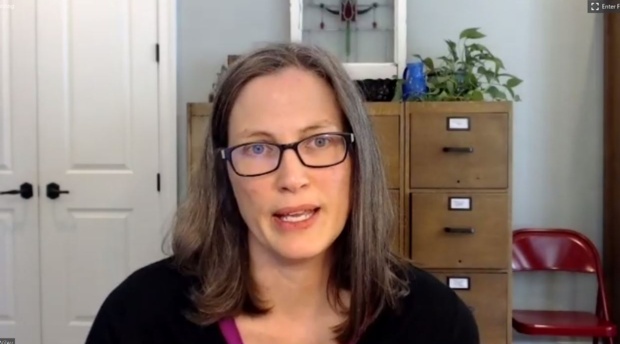Professor Lindsay Wiley Shares Insights on Health Policy Amid the Pandemic During "WCL Faculty Speaks: COVID-19 and Public Health Law"
June 11, 2020
On Thursday, June 11, Professor Lindsay Wiley, director of the AUWCL Health Law and Policy Program, addressed the legal and policy impacts of the global pandemic during “WCL Faculty Speaks: COVID-19 and Public Health Law.”

American University Washington College of Law's “WCL Faculty Speaks" series addresses key issues impacted by the COVID-19 crisis. The live webinars, hosted by Washington College of Law legal experts, address the state of international human rights, health law and policy, constitutional rights, national security, and more during the pandemic.
"We're looking to a combination of the Constitution and statutes at the federal level to think about the division of responsibility between the federal government and the states for pandemic prevention and response," Wiley said during the webinar, which was led by Professor Jonas Anderson, AUWCL’s associate dean of scholarship.
With Lawrence O. Gostin, Wiley is the co-author of Public Health Law: Power, Duty, Restraint (3d ed. 2016) and Public Health Law and Ethics: A Reader (3d ed. 2018). She has also authored numerous book chapters and articles on public health law and ethics, including on the prevention and control of climate sensitive and zoonotic infectious diseases. Her publications on the coronavirus pandemic response have appeared or are forthcoming in The Washington Post, the Harvard Law Review Forum, Health Affairs Blog, the American Constitution Society’s Expert Forum, the Berkley Forum, and Democracy.
"The structure is set up so that the states hold the reins on what we call community mitigation measures: social distancing, mask wearing," Wiley explained. "On the other hand, the federal government, I've argued, is the sole actor in this country with the resources and the inter-state coordinating authority to provide for other responses — particularly a massive scale of testing and tracing; well-coordinated supported isolation which could have contained the pandemic, as some other countries have successfully done; and now, surveillance level testing, to inform those state-level responses. The federal government's authority there is permissive, rather than mandatory."
Wiley said that because of this, there must be reforms at the federal level that introduce mandatory language and direction from Congress requiring the federal government, as the sole actor with the capabilities to implement such interventions, to do so.
Looking ahead, Wiley also anticipates a big wave of reform at the state level, given the history of past crisis.
"Executives have much more clarity about the statutory guardrails that apply to individual quarantine orders than they do for social distancing and the general population, in part because individual quarantine was threatened in response to the HIV epidemic," Wiley said. "There was a reform effort to ensure the quarantine orders reflect the best scientific evidence about risk. I think we will see similar reform for these broadly applied, general population orders we've seen with social distancing. And I think that's a positive development."